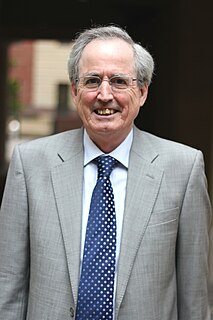
Linacre College is a constituent college of the University of Oxford in the UK whose members comprise approximately 50 fellows and 550 postgraduate students.

John Henry Constantine Whitehead FRS, known as Henry, was a British mathematician and was one of the founders of homotopy theory. He was born in Chennai, in India, and died in Princeton, New Jersey, in 1960.
The Edinburgh Mathematical Society is a mathematical society for academics in Scotland.
The Rouse Ball Professorship of Mathematics is one of the senior chairs in the Mathematics Departments at the University of Cambridge and the University of Oxford. The two positions were founded in 1927 by a bequest from the mathematician W. W. Rouse Ball. At Cambridge, this bequest was made with the "hope that it might be found practicable for such Professor or Reader to include in his or her lectures and treatment historical and philosophical aspects of the subject."
The Adams Prize is one of the most prestigious prizes awarded by the University of Cambridge. It is awarded each year by the Faculty of Mathematics at the University of Cambridge and St John's College to a UK-based mathematician for distinguished research in the Mathematical Sciences.
Dominic David Joyce FRS is a British mathematician, currently a professor at the University of Oxford and a fellow of Lincoln College since 1995. His undergraduate and doctoral studies were at Merton College, Oxford. He undertook a DPhil in geometry under the supervision of Simon Donaldson, completed in 1992. After this he held short-term research posts at Christ Church, Oxford, as well as Princeton University and the University of California, Berkeley in the United States.

Graham Higman FRS was a prominent English mathematician known for his contributions to group theory.

Robin James Wilson is an emeritus professor in the Department of Mathematics at the Open University, having previously been Head of the Pure Mathematics Department and Dean of the Faculty. He was a Stipendiary Lecturer at Pembroke College, Oxford and, as of 2006, Professor of Geometry at Gresham College, London, where he has also been a visiting professor. On occasion, he guest-teaches at Colorado College in the United States.
The British Society for the History of Mathematics (BSHM) was founded in 1971 to promote research into the history of mathematics at all levels and to further the use of the history of mathematics in education.

The Mathematical Institute is the mathematics department at the University of Oxford, England. It forms one of the twelve departments of the Mathematical, Physical and Life Sciences Division in the university. The department is located between Somerville College and Green Templeton College on Woodstock Road, next to the Faculty of Philosophy.

Dame Frances Clare Kirwan, is a British mathematician, currently Savilian Professor of Geometry at the University of Oxford. Her fields of specialisation are algebraic and symplectic geometry.

Gérard Laumon is a French mathematician, best known for his results in number theory, for which he was awarded the Clay Research Award.

Sergei Gukov is a Russian-American mathematical and theoretical physicist. Gukov graduated from Moscow Institute of Physics and Technology (MIPT) in Moscow, Russia before obtaining a doctorate in physics from Princeton University under the supervision of Edward Witten.

Jeremy John Gray is an English mathematician primarily interested in the history of mathematics.

Richard Paul Winsley Thomas FRS is a British mathematician working in several areas of geometry. He is a professor at Imperial College London. He studies moduli problems in algebraic geometry, and ‘mirror symmetry’—a phenomenon in pure mathematics predicted by string theory in theoretical physics.

Martin Robert Bridson is a Manx mathematician. He is the Whitehead Professor of Pure Mathematics at the University of Oxford, and President of the Clay Mathematics Institute. He was previously Head of Oxford's Mathematical Institute. He is a Fellow of Magdalen College, Oxford and an Honorary Fellow of Hertford College, Oxford. Specializing in geometry, topology and group theory, Bridson is best known for his work in geometric group theory.

Raymond Flood is Emeritus Fellow and a member of the Continuing Education Department at Kellogg College, Oxford, and has been a Professor of Geometry at Gresham College.

Mark William Gross is an American mathematician, specializing in differential geometry, algebraic geometry, and mirror symmetry.
The Lighthill-Thwaites Prize of the Institute of Mathematics and its Applications (IMA), in cooperation with the Institute’s Journal of Applied Mathematics and the British Applied Mathematics Colloquium (BAMC), is a biennial prize established in 2011 by the IMA in honour of the achievement of its first two Presidents – Professors Sir James Lighthill and Sir Bryan Thwaites. The prize honours young applied mathematicians, and applicants submit papers for review. A committee reviews the papers, invites shortlisted candidates to give lectures at the Lighthill-Thwaites meeting, and then awards a First Prize.
John Fauvel was a British mathematician and historian of mathematics.













